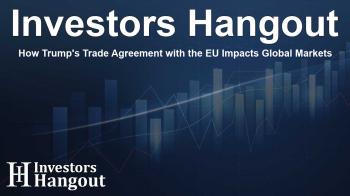How Trump's Trade Agreement with the EU Impacts Global Markets

Trump's New Trade Agreement with the EU
Recently, President Donald Trump announced a significant trade deal with the European Union (EU). This agreement includes the imposition of 15% tariffs on various EU exports, notably cars. This move is pivotal, as it not only affects trade relations but also has broader implications for both US and international markets.
Implications of the Agreement
During the announcement, Trump collaborated with Ursula von der Leyen, signaling a cooperative effort to enhance economic relations between the US and Europe. The deal represents a strategic pivot towards tariffs that are workable and could generate substantial revenue for the US while avoiding the appearance of a trade embargo. Such a strategy is essential for maintaining a balanced economic environment.
Key Features of the Agreement
One of the main points of this trade deal is to remove uncertainty from the market. By clarifying tariff rates with major trade partners, the Federal Reserve gains valuable insight into economic conditions, allowing for better monetary policy decisions. This clarity can foster a more stable economic environment.
Beneficiaries of the Deal
The recent agreements are likely to benefit under-owned assets in Europe and Asia significantly. Countries such as Poland, the Czech Republic, and Indonesia present interesting investment opportunities. These markets might experience favorable conditions due to the renewed interest generated by the trade deal.
Potential Impact on US Stock Markets
As investors weigh the implications of this trade agreement, many are wondering if it could serve as a catalyst for driving US stock markets higher. With increased clarity surrounding tariffs, investors may feel more confident about entering the market.
Looking Ahead
The economic landscape is constantly changing, and this trade deal could be a pivotal moment. Monitoring the reactions of different markets and sectors will be crucial in understanding the long-term effects of this agreement.
Frequently Asked Questions
What was the main objective of Trump's trade agreement with the EU?
The primary goal was to establish a framework for tariffs that generates revenue while creating a stable trading environment for both parties.
How will the trade deal affect US stock markets?
The clarity surrounding the new tariffs could boost investor confidence, potentially leading to an increase in US stock markets.
Which markets are expected to benefit the most from this agreement?
Under-owned assets in Europe and Asia, particularly in countries like Poland and Indonesia, are expected to be among the primary beneficiaries.
What does the agreement mean for investors in emerging markets?
Investors may find new opportunities in emerging markets as they react positively to the changes in trade dynamics established by this deal.
How does this agreement compare to previous trade negotiations?
This agreement introduces a more cooperative approach compared to previous negotiations, focusing on clarity and mutual benefits.
About The Author
Contact Dominic Sanders privately here. Or send an email with ATTN: Dominic Sanders as the subject to contact@investorshangout.com.
About Investors Hangout
Investors Hangout is a leading online stock forum for financial discussion and learning, offering a wide range of free tools and resources. It draws in traders of all levels, who exchange market knowledge, investigate trading tactics, and keep an eye on industry developments in real time. Featuring financial articles, stock message boards, quotes, charts, company profiles, and live news updates. Through cooperative learning and a wealth of informational resources, it helps users from novices creating their first portfolios to experts honing their techniques. Join Investors Hangout today: https://investorshangout.com/
The content of this article is based on factual, publicly available information and does not represent legal, financial, or investment advice. Investors Hangout does not offer financial advice, and the author is not a licensed financial advisor. Consult a qualified advisor before making any financial or investment decisions based on this article. This article should not be considered advice to purchase, sell, or hold any securities or other investments. If any of the material provided here is inaccurate, please contact us for corrections.

